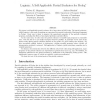230 search results - page 32 / 46 » Automation for Dependently Typed Functional Programming |
159
Voted
PLDI
2011
ACM
14 years 5 months ago
2011
ACM
Software modifications are often systematic—they consist of similar, but not identical, program changes to multiple contexts. Existing tools for systematic program transformati...
115
Voted
ICFP
2006
ACM
16 years 2 months ago
2006
ACM
The development of design patterns in object-oriented programming aims at capturing good software design in a re-usable generic form. However, design patterns are not expressible ...
140
click to vote
LOPSTR
1992
Springer
15 years 6 months ago
1992
Springer
We present a self-applicable partial evaluator for a large subset of full Prolog. The partial evaluator, called Logimix, is the result of applying our experience from partial eval...
91
Voted
ICLP
1999
Springer
15 years 7 months ago
1999
Springer
This paper presents a programming language that includes paradigms that are usually associated with declarative languages, such as sets, rules and search, into an imperative (funct...
114
Voted
POPL
2010
ACM
16 years 5 days ago
2010
ACM
In functional programming, monadic characterizations of computational effects are normally understood denotationally: they describe how an effectful program can be systematically ...

